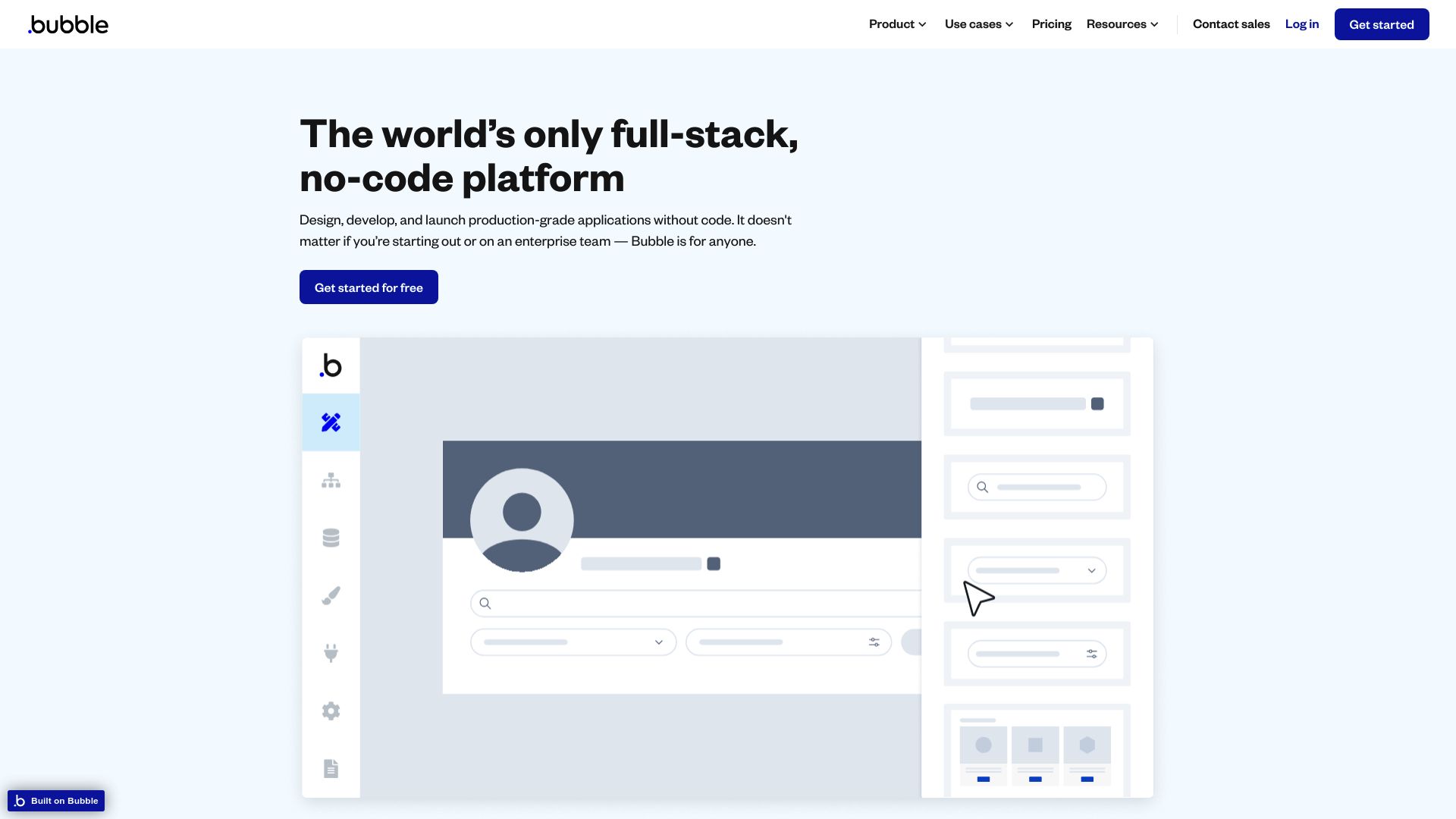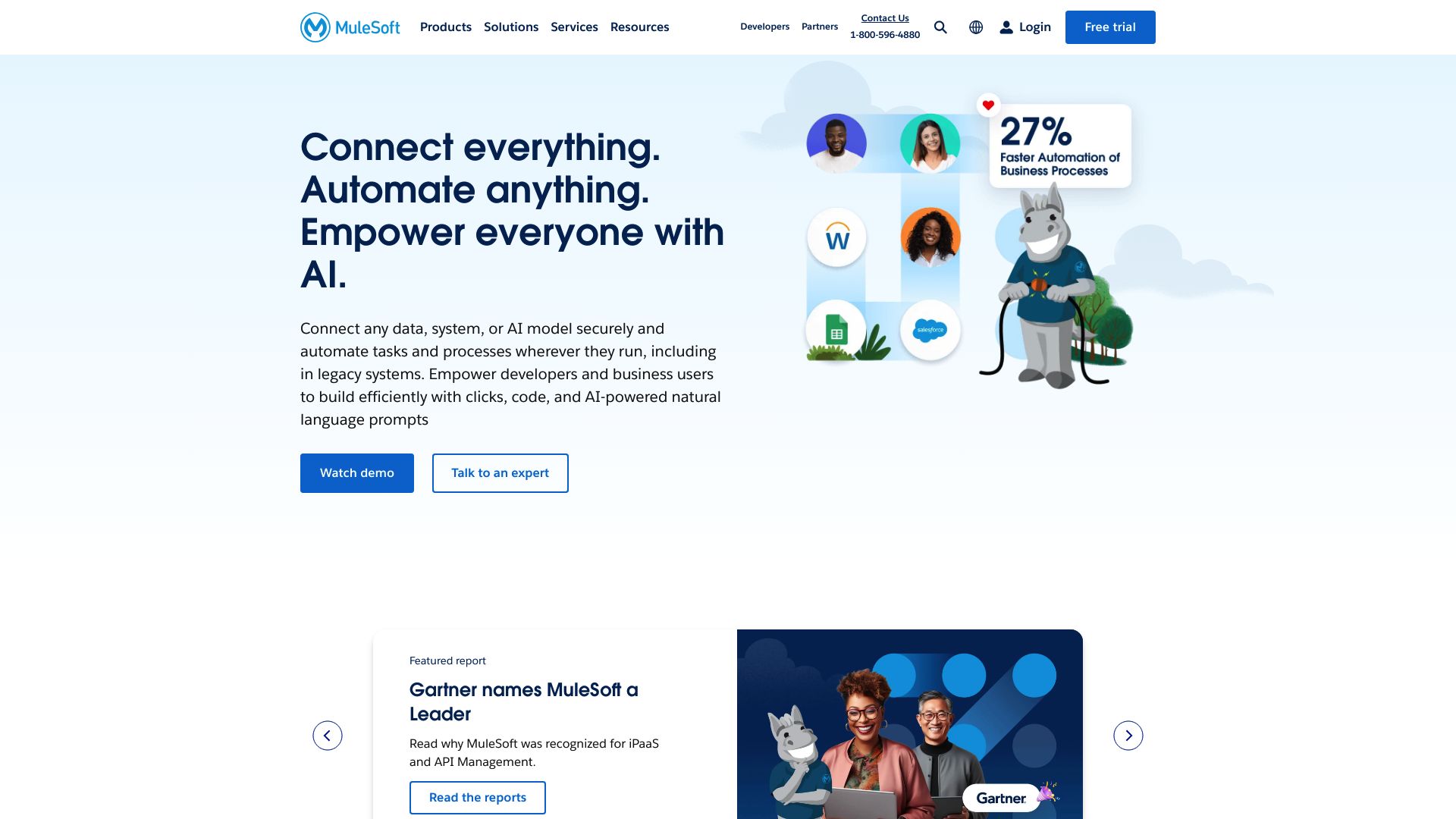Bubble vs. Mulesoft: Comparing No-Code and Enterprise Integration Solutions
AI-powered platforms revolutionize software development, integration, and business process automation. This comparison delves into Bubble vs. Mulesoft, and SmythOS, three distinct solutions catering to different needs in the AI landscape. Bubble offers no-code web application development, ideal for small businesses and non-technical users.
Mulesoft provides enterprise-grade API management and integration, suited for large organizations with complex needs. SmythOS emerges as a comprehensive AI-driven platform, combining intuitive design with advanced capabilities. This review examines each platform’s strengths, limitations, and ideal use cases, equipping readers to make informed decisions about which solution best aligns with their AI and automation goals.
Bubble Overview
Bubble empowers users to build web applications without writing code. Its visual interface allows drag-and-drop creation of complex web apps, making software development accessible to non-technical users. Bubble’s platform integrates AI capabilities through APIs and plugins, enabling features like chatbots and content generation powered by models such as OpenAI’s GPT.


Bubble empowers users to build web applications without writing code. Its visual interface allows drag-and-drop creation of complex web apps, making software development accessible to non-technical users.
The platform offers both development and production environments, allowing users to test applications before deployment. Bubble’s marketplace provides templates and plugins to jumpstart projects or add functionality. Built on Amazon Web Services, Bubble ensures robust infrastructure with security features including GDPR compliance and SOC 2 Type II certification.
While Bubble excels in web application development, it lacks some AI-specific features. The platform does not offer hosted AI agents or autonomous agent capabilities. Instead, it focuses on integrating external AI services. This approach may limit users seeking to develop advanced AI applications entirely within one ecosystem.
Bubble’s strength lies in its visual development tools and extensive integration options. The platform supports various APIs and services like Zapier, enabling connections to a wide range of external tools. This flexibility allows businesses to create custom solutions that leverage AI without requiring deep technical expertise in AI development.
Mulesoft Overview
Mulesoft stands at the forefront of enterprise integration and API management solutions. The company’s flagship product, Anypoint Platform, empowers organizations to design, build, and manage APIs that connect applications, data, and devices across on-premises and cloud environments.
Mulesoft specializes in API-led connectivity, enabling businesses to create reusable and secure digital assets. This approach allows companies to rapidly adapt to changing market conditions and customer demands. The platform’s integration capabilities extend to AI systems, enhancing data flow and improving AI-driven decision-making processes across various business functions.
Mulesoft specializes in API-led connectivity, enabling businesses to create reusable and secure digital assets. This approach allows companies to rapidly adapt to changing market conditions and customer demands.


Anypoint Platform offers full-lifecycle API management, covering design, development, deployment, and monitoring. This comprehensive suite allows developers and IT teams to create robust, scalable integration solutions. Mulesoft’s recent integration of Einstein AI into Anypoint Code Builder demonstrates the company’s commitment to innovation, enabling developers to initiate projects through natural language prompts and enhancing overall productivity.
Security and governance are paramount in Mulesoft’s offerings. Anypoint Flex Gateway and API Governance features ensure that APIs are managed securely and in compliance with organizational policies. This focus on security is crucial for enterprises dealing with sensitive data and complex regulatory environments.
Security and governance are paramount in Mulesoft’s offerings. Anypoint Flex Gateway and API Governance features ensure that APIs are managed securely and in compliance with organizational policies.
While Mulesoft excels in enterprise-grade integration and API management, it may present a learning curve for smaller organizations or those new to API-led approaches. The platform’s extensive capabilities can be overwhelming for users seeking simple, out-of-the-box solutions. Additionally, pricing for Mulesoft’s solutions may be a consideration for budget-conscious businesses, as the robust feature set comes with a corresponding investment.
Mulesoft’s vision centers on empowering organizations with robust integration and automation capabilities that leverage AI to create efficient, secure, and adaptive business processes. By connecting everything, automating anything, and empowering everyone with AI, Mulesoft aims to lead the charge in digital transformation across industries.
Feature Comparison
Bubble and Mulesoft offer distinct approaches to software development and integration. Bubble excels in visual, no-code web application development, while Mulesoft specializes in enterprise-grade API management and integration.
Bubble’s drag-and-drop interface enables rapid application creation without coding, ideal for small businesses and non-technical users. However, it lacks advanced AI agent capabilities and autonomous operations. Mulesoft, conversely, provides robust API-led connectivity and integration solutions, including AI-enhanced features like Einstein AI in Anypoint Code Builder. This makes Mulesoft better suited for large enterprises with complex integration needs and AI aspirations.
In security and governance, Mulesoft outperforms Bubble with enterprise-level features like Anypoint Flex Gateway and comprehensive API governance tools. While Bubble offers basic security measures, it falls short in providing the depth of control and compliance capabilities that Mulesoft delivers for handling sensitive enterprise data.
Feature Comparison Table
| Bubble | Mulesoft | SmythOS | |
|---|---|---|---|
| CORE FEATURES | |||
| Memory & Context | ❌ | ❌ | ✅ |
| Autonomous Agents | ❌ | ✅ | ✅ |
| Explainability & Transparency | ❌ | ❌ | ✅ |
| Multimodal | ❌ | ✅ | ✅ |
| Problem-Solving Capabilities | ✅ | ❌ | ✅ |
| Multi-Agent Collaboration | ❌ | ✅ | ✅ |
| Human-AI Interaction | ✅ | ❌ | ✅ |
| Audit Logs for Analytics | ✅ | ❌ | ✅ |
| Bulk Work | ❌ | ✅ | ✅ |
| Agent Work Scheduler | ❌ | ✅ | ✅ |
| SECURITY | |||
| Constrained Alignment | ❌ | ✅ | ✅ |
| Data Encryption | ✅ | ❌ | ✅ |
| IP Control | ❌ | ✅ | ✅ |
| COMPONENTS | |||
| Huggingface AIs | ❌ | ❌ | ✅ |
| Zapier APIs | ✅ | ❌ | ✅ |
| All other APIs, RPA | ✅ | ❌ | ✅ |
| Classifiers | ❌ | ✅ | ✅ |
| Logic | ✅ | ❌ | ✅ |
| DEPLOYMENT OPTIONS (EMBODIMENTS) | |||
| Deploy as API | ❌ | ✅ | ✅ |
| Deploy as Scheduled Agent | ❌ | ❌ | ✅ |
| Scalability | ✅ | ❌ | ✅ |
| DATA LAKE SUPPORT | |||
| Hosted Vector Database | ❌ | ✅ | ✅ |
| Sitemap Crawler | ❌ | ❌ | ✅ |
| YouTube Transcript Crawler | ❌ | ❌ | ✅ |
| URL Crawler | ❌ | ❌ | ✅ |
| PDF Support | ✅ | ❌ | ✅ |
Best Alternative to Bubble and Mulesoft
SmythOS emerges as the superior alternative to Bubble and Mulesoft, offering a comprehensive AI automation platform that combines ease of use with powerful features. Our platform stands out by providing a versatile solution for creating and deploying AI agents across various use cases.
Unlike Bubble’s focus on visual web application development or Mulesoft’s emphasis on API management, SmythOS delivers a complete ecosystem for AI agent creation and management. We offer a user-friendly drag-and-drop interface that surpasses Bubble’s simplicity while maintaining the advanced capabilities needed for complex AI workflows.
SmythOS excels in areas where Bubble and Mulesoft fall short. Our platform supports autonomous agents, multi-agent collaboration, and advanced problem-solving capabilities.
SmythOS excels in areas where Bubble and Mulesoft fall short. Our platform supports autonomous agents, multi-agent collaboration, and advanced problem-solving capabilities. These features enable businesses to automate complex tasks and create intelligent systems that can operate independently, a significant advantage over the limited AI functionalities of Bubble and the integration-focused approach of Mulesoft.
Security and scalability are paramount in SmythOS. We provide robust data encryption, IP control, and constrained alignment features that match or exceed the enterprise-grade security offered by Mulesoft. Unlike Bubble’s basic security measures, SmythOS ensures your AI agents and data remain protected at all levels of operation.
SmythOS’s unlimited use cases set it apart from both Bubble and Mulesoft. Our platform supports a wide range of deployment options, including APIs, webhooks, scheduled agents, and site chats. This versatility allows businesses to implement AI solutions across various channels and touchpoints, providing a level of flexibility unmatched by either Bubble or Mulesoft.
Conclusion
Bubble and Mulesoft offer unique approaches to software development and integration, each with its own strengths. Bubble excels in visual, no-code web application development, making it ideal for small businesses and non-technical users. Mulesoft, on the other hand, provides robust API-led connectivity and integration solutions, better suited for large enterprises with complex needs.
While both platforms have their merits, SmythOS emerges as the superior choice for businesses seeking a comprehensive AI-driven solution. SmythOS combines the best of both worlds — offering an intuitive drag-and-drop interface like Bubble, while providing enterprise-grade integration capabilities similar to Mulesoft. Our platform goes further by incorporating advanced AI features, including hosted agents, autonomous operations, and multi-agent collaboration.
SmythOS stands out with its ’Create Once, Deploy Anywhere’ philosophy, allowing users to build AI agents that seamlessly integrate across multiple environments. This versatility, coupled with our extensive ecosystem of over 300,000 integrations, empowers businesses to orchestrate complex workflows with unprecedented ease and efficiency.
For those ready to revolutionize their approach to AI and automation, we invite you to explore our diverse range of AI-powered agent templates and create a free SmythOS account. Experience firsthand how SmythOS can transform your business processes, boost productivity, and unlock the full potential of AI-driven innovation.
Last updated:
Disclaimer: The information presented in this article is for general informational purposes only and is provided as is. While we strive to keep the content up-to-date and accurate, we make no representations or warranties of any kind, express or implied, about the completeness, accuracy, reliability, suitability, or availability of the information contained in this article.
Any reliance you place on such information is strictly at your own risk. We reserve the right to make additions, deletions, or modifications to the contents of this article at any time without prior notice.
In no event will we be liable for any loss or damage including without limitation, indirect or consequential loss or damage, or any loss or damage whatsoever arising from loss of data, profits, or any other loss not specified herein arising out of, or in connection with, the use of this article.
Despite our best efforts, this article may contain oversights, errors, or omissions. If you notice any inaccuracies or have concerns about the content, please report them through our content feedback form. Your input helps us maintain the quality and reliability of our information.
